- Home
- Fredric Brown
Nightmares & Geezenstacks Page 3
Nightmares & Geezenstacks Read online
Page 3
He, Smith, was here because he’d been invited by Bill Halperin, who was one of Granny’s sons; he was Bill’s attorney and also his friend. The other outsider, a Gene or Jean Cross, seemed to be a friend of several of the grandson-generation Halperins.
Across the room he saw that Cross was talking to Hank Halperin and noticed that whatever they were saying had suddenly led to raised and angry voices. Smith hoped there wouldn’t be trouble; the party was much too pleasant to be broken up now by a fight or even an argument. But suddenly Hank Halperin’s fist lashed out and caught Cross’s jaw and Cross went backward and fell. His head hit on the stone edge of the fireplace with a loud thunk and he lay still. Hank quickly ran and knelt beside Cross and touched him, and then Hank was pale as he looked up and then stood up. “Dead,” he said thickly. “God, I didn’t mean to—But he said—”
Granny wasn’t smiling now. Her voice rose sharp and querulously. “He tried to hit you first, Henry. I saw it. We all saw it, didn’t we?”
She had turned, with the last sentence, to frown at Wade Smith, the surviving outsider.
Smith moved uncomfortably. “I—I didn’t see the start of it, Mrs. Halperin.”
“You did,” she snapped. “You were looking right at them, Mr. Smith.”
Before Wade Smith could answer, Hank Halperin was saying, “Lord, Granny, I’m sorry—but even that’s no answer. This is real trouble. Remember I fought seven years in the ring as a pro. And the fists of a boxer or an ex-boxer are legally considered lethal weapons. That makes it second-degree murder even if he did hit. first. You know that, Mr. Smith; you’re a lawyer. And with the other trouble I’ve been in, the cops will throw the book at me.”
“I—I’m afraid you’re probably right,” Smith said uneasily. “But hadn’t somebody better phone a doctor or the police, or both?”
“In a minute, Smith,” Bill Halperin, Smith’s friend, said. “We got to get this straightened out among ourselves first. It was self-defense, wasn’t it?”
“I—I guess. I don’t—”
“Wait, everybody,” Granny’s sharp voice cut in. “Even if it was self-defense, Henry’s in trouble. And do you think we can trust this man Smith once he’s out of here and in court?”
Bill Halperin said, “But, Granny, we’ll have to—”
“Nonsense, William. 1 saw what happened. We all did. They got in a fight, Cross and Smith, and killed each other. Cross killed Smith and then, dizzy from the blows he’d taken himself, fell and hit his head. We’re not going to let Henry go to jail, are we, children? Not a Halperin, not one of us. Henry, muss that body up a little, so it’ll look like he was in a fight, not just a one-punch business. And the rest of you—”
The male Halperins, except Henry, were in a circle around Smith now; the women, except Granny, were right behind them—and the circle closed in.
The last thing Smith saw clearly was Granny in her throne-like chair, her eyes beady with excitement and determination. And the last thing Smith heard in the sudden silence which he could no longer make his voice penetrate was the soft sound of Granny Halperin’s chuckling. Then the first blow rocked him.
CAT BURGLAR
The Chief of Police of Midland City owned two dachshunds, one of which was named Little Note and the other Long Remember. But this fact has nothing at all to do with cats or cat burglars, and this story concerns the concern of the said Chief of Police over a seemingly inexplicable series of burglaries—a one-man crime wave.
The burglar had broken and entered nineteen houses or apartments within a period of a few weeks. Apparently he cased his jobs carefully, since it could not have been coincidence that in each and every house he burglarized there was a cat.
He stole only the cat.
Sometimes there had been money lying loose in sight, sometimes jewelry; he ignored them. Returning householders would find a window or door forced, and their cat missing, nothing else Was ever stolen or disturbed.
It was for this reason that—if we wish to belabor the obvious, and we do so wish—the newspapers and the public came to call him the Cat Burglar.
Not until his twentieth—and first unsuccessful—burglary attempt was he caught. With the help of the newspapers, the police had set a trap by publicizing the fact that the owners of a prize-winning Siamese cat had just returned with it from a cat show in a nearby city, where it won not only the best-of-breed prize, but the much more prized prize for the best of show.
Once this story, accompanied by a beautiful picture of the animal, had appeared in the newspapers, the police staked out the house and had the owners of it leave, and in an obvious manner.
Only two hours later the burglar appeared, broke into the house and entered it. They caught him cold on his way out, with the champion Siamese under his arm.
Downtown at the police station, they questioned him. The Chief of Police was curious, and so were the listening reporters.
To their surprise, the burglar was able to give a perfectly logical and understandable explanation of the unusual and specialized nature of his thefts. They didn’t release him, of course, and eventually he was tried, but he received an exceedingly light sentence since even the judge agreed that, although his method of acquiring cats had been illegal, his purpose in acquiring them had been laudable.
He was an amateur scientist. For research in his field, he needed cats. The stolen cats he had taken home and put mercifully into eternal rest. Then he had cremated the cats in a small crematory which he had built for the purpose.
He had put their ashes in jars and was experimenting with them, pulverizing them to various degrees of fineness, treating different batches in different ways, and then pouring hot water over them. He had been trying to discover the formula for instant pussy.
THE HOUSE
He hesitated upon the porch and looked a last long look upon the road behind him and the green trees that grew beside it and the yellow fields and the distant hill and the bright sunlight. Then he opened the door and entered and the door swung shut behind him.
He turned as it clicked and saw only blank wall. There was no knob and no keyhole, and the edges of the door, if there were edges, were so cunningly fitted into the carven paneling that he could not discern its outline.
Before him lay the cobwebbed hallway. The floor was thick with dust and through the dust wound two so slender curving trails as might have been made by two very small snakes or two very large caterpillars. They were very faint trails and he did not notice them until he was opposite the first doorway to the right, upon which was the inscription Semper Fidelis in old English lettering.
Beyond this door he found himself in a small red room, no larger than a large closet. A single chair in this room lay on its side, one leg broken and dangling by a thin splinter. On the nearest wall the only picture was a framed portrait of Benjamin Franklin. It hung askew and the glass covering it was cracked. There was no dust upon the floor and the room appeared to have been recently cleaned. In the center of the floor lay a bright curved scimitar. There were red stains upon its hilt, and upon the edge of the blade was a thick coating of green ooze. Aside from these things the room was empty.
After he had stood in this room for a long time, he crossed the hallway and entered the room opposite. It was large, the size of a small auditorium, but the bare black walls made it seem smaller at a first glance. There was row upon row of purple-plush theater seats, but there was no stage or platform and the rows of seats started only a few inches from the blank wall they faced. There was nothing. else in the room, but upon the nearest seat lay a neat pile of programs. One of these he took and found it blank save for two advertisements on the back cover, one for Prophylactic toothbrushes and the other for choice building lots in the Sub Rosa Subdivision. Upon a page near the front of the program he saw that someone had written with a lead pencil the word or name Garfinkle.
He thrust the program into his pocket and returned to the hallway, along which he walked in search of the stairs.
Behind one closed door which he passed he heard someone, obviously an amateur, picking out tunes on what sounded like a Hawaiian guitar. He knocked upon this door but a scurrying of footsteps and silence was the only answer. When he opened the door and peered within he saw only a decaying corpse hanging from the chandelier, and an odor hurled itself upon him, so nauseating that he closed the door hastily, and walked on to the stairway.
The stairway was narrow and winding. There was no banister, and he clung close to the wall as he ascended. He saw that the first seven steps from the bottom had been scrubbed clean but in the dust above the seventh step he saw again the two winding trails. Upon the third step from the top they converged, and vanished.
He entered the first door to his right and found himself in a spacious bedroom, lavishly furnished. He crossed immediately to the carven poster bed and pulled aside the curtains. The bed was neatly made, and he saw a slip of paper pinned to the smoothed pillow. Upon it was written hastily in a woman’s handwriting, Denver, 1909. Upon the reverse side, neatly written in ink in another handwriting, was an algebraic equation.
He left this room quietly and stopped short just outside the door to listen to a sound that came from behind a black doorway across the hall.
It was the deep voice of a man chanting in a strange and unfamiliar tongue. It rose and fell in a monotonous cadence like a Buddhist hymn, yet over and over recurred the word Ragnarok. The word seemed vaguely familiar, and the voice sounded like his own voice, but muffled by many things.
With bowed head he stood until the voice died away into a blue trembling silence and twilight crept into the hallway with the stealth of a practiced thief.
Then as though awakening, he walked along the now-silent hallway until he came to the third and last door and he saw that they had printed his name upon the upper panel in tiny letters of gold. Perhaps radium had been mixed with the gold for the letters glowed in the hallway’s dimness.
He stood for a long moment with his hand upon the knob, and then at last he entered and closed the door behind him. He heard the click of the latch and knew that it would never open again, yet he felt no fear.
The darkness was a black tangible thing that sprang back from him when he struck a match. He saw then that the room was a counterpart of the east bedroom of his father’s house near Wilmington, the room in which he had been born. He knew, now, just where to look for candles. There were two in the drawer, and the stump of a third, and he knew that, burned one at a time, they would last for almost ten hours. He lighted the first and stood it in the brass bracket on the wall, from whence it cast dancing shadows from each chair, from the bed, and from the small waiting cradle that stood beside the bed.
Upon the table beside his mother’s sewing basket lay the March 1887 issue of Harper’s, and he took up the magazine and glanced idly through its pages.
At length he dropped it to the floor and thought tenderly of his wife who had died many years ago, and a faint smile trembled upon his lips as he remembered a dozen little incidents of the years of days and nights they had spent together. He thought, too, of many other things.
It was not until the ninth hour when but half an inch of candle remained and darkness began to gather in the farther corners of the room and to creep closer, that he screamed, and beat and clawed at the door until his hands were a raw and bloody pulp.
SECOND CHANCE
Jay and I were in the stands at New Comiskey Field in Chicago to watch the replay of the October 9, 1959, game of the World Series, and play was about to start.
In the original game just exactly five hundred years ago, the Los Angeles Dodgers had won, nine to three, which had ended the series in six games and had given them the championship. Of course it could come out differently this time, although conditions at the start were as near as possible to those of the original game.
The Chicago White Sox were out on the field and the starting players were tossing the ball around the infield a few times before throwing it to Wynn, the starting pitcher, to take his warm-up pitches. Kluszewski was on first, Fox on second, Goodman on third, and Aparicio was playing short. Gilliam was coming up to bat first for the Dodgers, with Neal on deck. Podres would be their starting pitcher.
They were not the original players of those names, of course. They were androids, artificial men who differ from robots in that they are made not of metal but of flexible plastics, powered by laboratory-grown muscles, and designed as exact simulacrums of human beings. These were as nearly exact replicas as possible of the original players of half a millennium ago. As with all reproduced athletes of ancient games and contests, early records, pictures, television films, and other sources had been exhaustively studied; each android not only looked like and played like the ancient player he represented, but was adjusted to be just as skillful as and no more skillful than his prototype. He hadn’t played over an entire season-baseball is now limited to the set of World Series games played once a year on the semimillennial anniversaries of the original games—but if he had played for the whole season his batting and fielding averages would have been identical to those of the player he imitated; so would the earned-run average of the pitchers.
In theory the scores should come out the same as those of the individual games, but of course there are the breaks, and the fact that the respective managers-also androids-may choose to issue different instructions and make different substitutions. The same team usually wins the Series that originally won it, but not always in the same number of games, and the scores of individual games sometimes vary widely from the original scores.
This particular game kept the same score, nothing to nothing, for two innings, as the original, but it varied widely in the third; that had been the big inning for the Dodgers with six runs. This time Wynn let three men get on base with only one out, but managed to put out the fire and hold the Dodgers scoreless.
The stands and bleachers started roaring. And Jay, who favors the White Sox, made me a bet; he’d been afraid to offer even odds till that half inning was over.
In the sixth inning—but the game is on record, so why go into details? The White Sox did win, by a one-run margin, and stayed in the Series. It was three games apiece, and the Sox would have a chance tomorrow to make it a complete upset and win the championship.
Jay (his real name is J with twelve digits after it) and I stood up to leave, as did the rest of the spectators. There was a wave of bright steel throughout the stands.
“I wonder,” Jay said, “what it would be like to see a game really played by human beings, as it used to be.”
“I wonder,” I said, “what it would be like just to see a real human being. I’m less than two hundred and there haven’t been any alive for at least four hundred years. How’d you like to go with me for a lube job? If I don’t get one today I’ll start getting rusty. And how do you want to bet on tomorrow’s game? The White Sox have a second chance, even if the human race hasn’t. Well, we keep their traditions alive as much as we can.”
GREAT LOST DISCOVERIES I –
Invisibility
Three great discoveries were made, and tragically lost, during the twentieth century. The first of these was the secret of invisibility.
The secret of invisibility was discovered in 1909 by Archibald Praeter, emissary from the court of Edward VII to the court of Sultan Abd el Krim, ruler of a small state loosely allied to the Ottoman Empire.
Praeter, an amateur but enthusiastic biologist, was injecting mice with various serums for the purpose of finding an injection which would cause mutations. When he injected his 3019th mouse, the mouse disappeared. It was still there; he could feel it in his hand, but he could not see a hair or claw of it. He put it carefully in a cage and two hours later it appeared again, unharmed.
He experimented with increasing dosages and found that he could make a mouse invisible for up to twenty-four hours. Larger doses made it ill or torpid. He also learned that a mouse killed while invisible reappeared insta
ntly at the moment of death.
Realizing the importance of his discovery, he wired his resignation to England, dismissed his servants and locked himself in his quarters, and began to experiment with himself. Starting with a small injection that made him invisible for only a few minutes, he worked up until he found his tolerance was equal to that of mice; an injection that made him invisible for more than twenty-four bows also made him ill. He also found that although nothing of his body was visible, not even his dentures if he kept his lips closed, nudity was essential; clothing did not become invisible with him.
Praeter was an honest and fairly well-to-do man, so he did not think of crime. He decided to return to England and offer his discovery to His Majesty’s government for use in espionage or war.
But he decided first to allow himself one indulgence. He had always been curious about the closely guarded harem of the Sultan to whose court he had been attached. Why not have a close look at it from inside?
Besides, something—some nagging thought that he couldn’t quite isolate—bothered him about his discovery. There was some circumstance under which… He couldn’t get beyond that point in his mind. An experiment was definitely in order.
He stripped and made himself invisible for the maximum period. It proved simple to walk past the armed eunuchs and enter the harem. He spent an interesting afternoon watching the fifty-odd beauties at their daytime occupation of keeping themselves beautiful, bathing and anointing their bodies with scented oils and perfumes.
One, a Circassian, especially attracted him. It occurred to him, just as it would have occurred to any man, that if he stayed the night—perfectly safe since he would be invisible until the following noon—he could keep her in sight to learn which room she slept in and, after the lights were out, join her; she would think the Sultan was favoring her with a visit.
He kept her in sight and noticed the room she entered. An armed eunuch took his post at the curtained doorway, others at each of the other doorways to the sleeping rooms. He waited until he was sure she would be asleep and then, at a moment when the eunuch was looking down the hall and would not see the movement of the curtain, he slipped through it. The light had been dim in the hallway; here the darkness was utter. But he groped carefully and managed to find the sleeping couch. Carefully he put out a hand and touched the sleeping woman. She screamed. (What he had not known was that the Sultan never visited the harem by night but sent for one, or sometimes several, of his wives to visit his own quarters.)

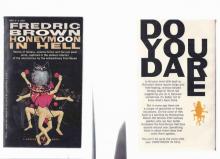 Hall of Mirrors
Hall of Mirrors Honeymoon in Hell
Honeymoon in Hell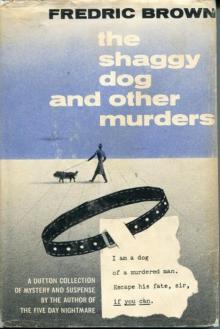 The Shaggy Dog and Other Murders
The Shaggy Dog and Other Murders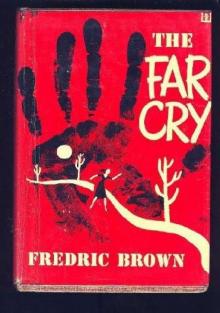 The Far Cry
The Far Cry Arena
Arena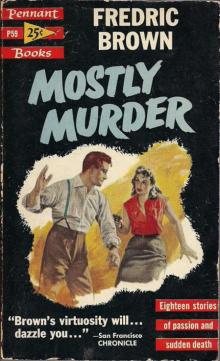 Mostly Murder
Mostly Murder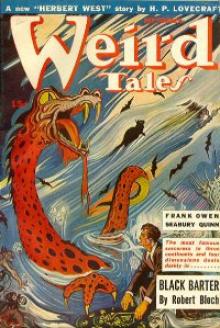 The Geezenstacks
The Geezenstacks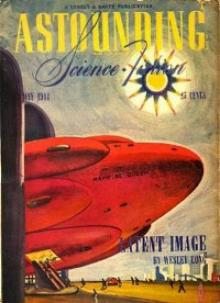 The Yehudi Principle
The Yehudi Principle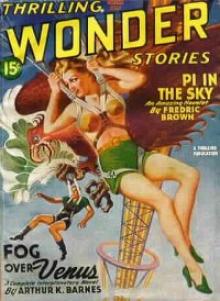 Pi in the Sky
Pi in the Sky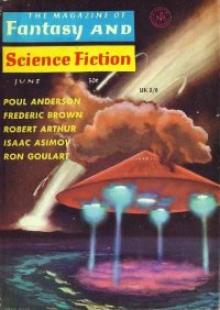 Eine Kleine Nachtmusik
Eine Kleine Nachtmusik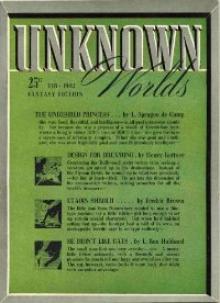 Etaoin Shrdlu
Etaoin Shrdlu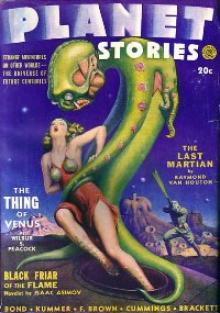 The Star Mouse
The Star Mouse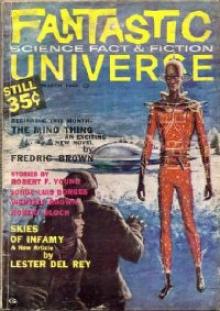 The Mind Thing
The Mind Thing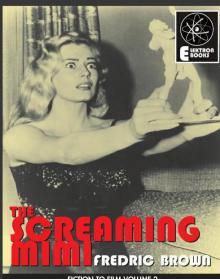 The Screaming Mimi
The Screaming Mimi The Fabulous Clipjoint
The Fabulous Clipjoint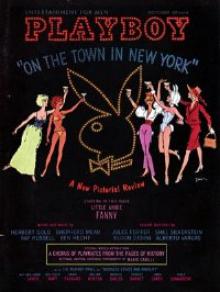 Puppet Show
Puppet Show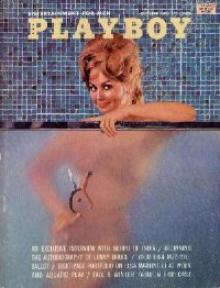 It Didn't Happen
It Didn't Happen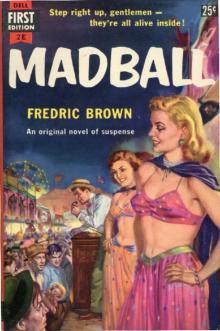 Madball
Madball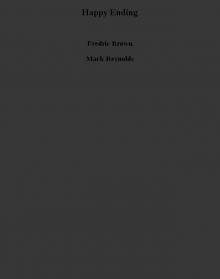 Happy Ending
Happy Ending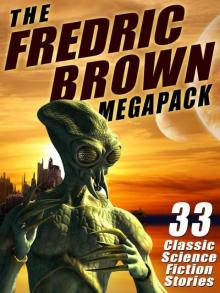 The Fredric Brown Megapack: 33 Classic Science Fiction Stories
The Fredric Brown Megapack: 33 Classic Science Fiction Stories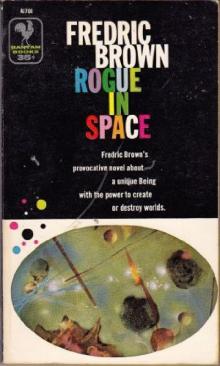 Rogue in Space
Rogue in Space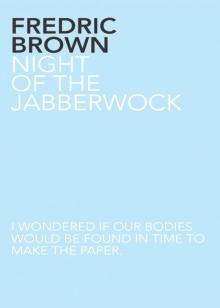 Night of the Jabberwock
Night of the Jabberwock The Dead Ringer
The Dead Ringer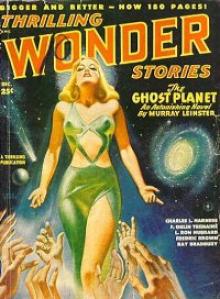 Knock
Knock We All Killed Grandma
We All Killed Grandma Space On My Hands
Space On My Hands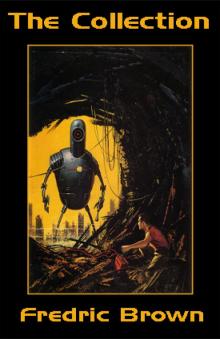 The Collection
The Collection The Second Fredric Brown Megapack: 27 Classic Science Fiction Stories
The Second Fredric Brown Megapack: 27 Classic Science Fiction Stories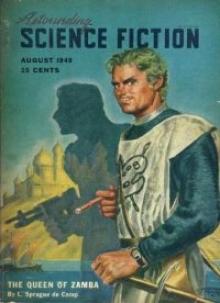 Letter to a Phoenix
Letter to a Phoenix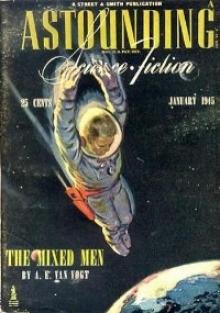 The Waveries
The Waveries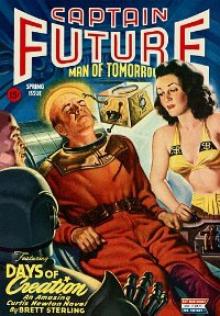 Nothing Sirius
Nothing Sirius The Deep End
The Deep End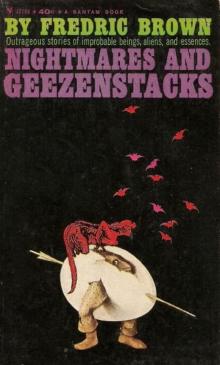 Nightmares & Geezenstacks
Nightmares & Geezenstacks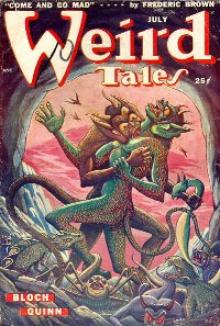 Come and Go Mad
Come and Go Mad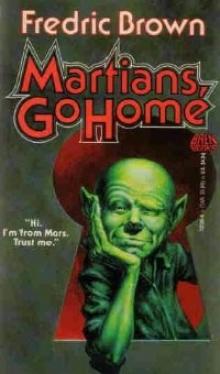 Martians, Go Home
Martians, Go Home